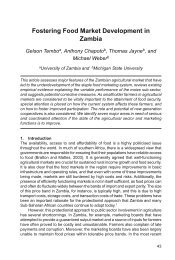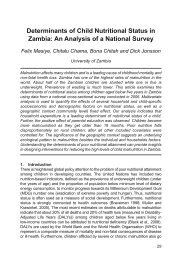Introduction to Basic Legal Citation - access-to-law home
Introduction to Basic Legal Citation - access-to-law home
Introduction to Basic Legal Citation - access-to-law home
You also want an ePaper? Increase the reach of your titles
YUMPU automatically turns print PDFs into web optimized ePapers that Google loves.
Mass. R. App. P. 16(g),<br />
http://www.<strong>law</strong>lib.state.ma.us/source/mass/rules/appellate/mrap16.html.<br />
RULE 16. BRIEFS<br />
. . . .<br />
(g) Massachusetts Reports between 17 Massachusetts and 97 Massachusetts shall be cited by<br />
the name of the reporter. Any other citation shall include, wherever reasonably possible, a<br />
reference <strong>to</strong> any official report of the case or <strong>to</strong> the official publication containing statu<strong>to</strong>ry or<br />
similar material. References <strong>to</strong> decisions and other authorities should include, in addition <strong>to</strong><br />
the page at which the decision or section begins, a page reference <strong>to</strong> the particular material<br />
therein upon which reliance is placed, and the year of the decision; as, for example: 334 Mass.<br />
593, 597-598 (1956). Quotations of Massachusetts statu<strong>to</strong>ry material shall include a citation<br />
<strong>to</strong> either the Acts and Resolves of Massachusetts or <strong>to</strong> the current edition of the General Laws<br />
published pursuant <strong>to</strong> a resolve of the General Court.<br />
Michigan: Supreme Court citation practice | <strong>Citation</strong> rule(s)<br />
195<br />
Contents | Index | Help | < | ><br />
Examples from Huggett v. Dep't of Natural Resources, 464 Mich. 711, 629<br />
N.W.2d 915 (2001)<br />
. . . .<br />
This case requires us <strong>to</strong> decide whether plaintiffs' proposed activities <strong>to</strong> build and operate a<br />
commercial cranberry farm in a wetland is exempt from the statu<strong>to</strong>ry wetland permit<br />
requirements, MCL 324.30304, because it is a farming activity that is not subject <strong>to</strong> the permit<br />
requirements under the farming activities exemption provided by MCL 324.30305(2)(e). We<br />
conclude that the farming activities exemption is not so broad that it encompasses plaintiffs'<br />
proposal. Also, the proposed cranberry farm does not fall within the production and<br />
harvesting draining exemption <strong>to</strong> the wetland permit requirements, MCL 324.30305(2)(j), or<br />
the existing farming exemption <strong>to</strong> the requirements, MCL 324.30305(3), that we ordered the<br />
parties <strong>to</strong> address. Therefore, plaintiffs must obtain a wetland permit <strong>to</strong> proceed with the<br />
proposed cranberry farm. Accordingly, we affirm the judgment of the Court of Appeals.<br />
. . . .<br />
When a statute uses a general term followed by specific examples included within the general<br />
term, as the farming activities exemption does, the canon of statu<strong>to</strong>ry construction ejusdem<br />
generis applies. See Belanger v Warren Bd of Ed, 432 Mich 575, 583; 443 NW2d 372 (1989).<br />
This canon gives effect <strong>to</strong> both the general and specific terms by "treating the particular words<br />
as indicating the class, and the general words as extending the provisions of the statute <strong>to</strong><br />
everything embraced in that class, though not specifically named by the particular words." Id.,<br />
quoting 2A Sands, Sutherland Statu<strong>to</strong>ry Construction (4th ed), § 47.17, p 166. In light of the




